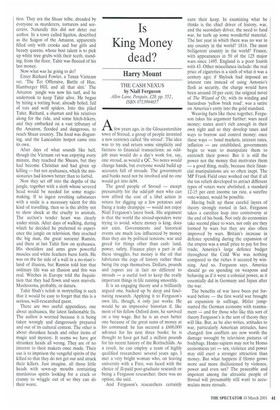Is King Money dead?
Harry Mount
THE CASH NEXUS
by Niall Ferguson
Allen Lane, Penguin, £20, pp. 552, ISBN 0713994657 Afew years ago, in the Gloucestershire town of Stroud, a group of people invented a new currency called 'the stroud'. The idea was to try and return some simplicity and fairness to financial transactions: an oddjob man would do a day's work for, say, one stroud, as would a QC. No notes would change hands, but everyone would build up accounts full of strouds. The government and banks need not be involved and no one would get into debt.
The good people of Stroud — except presumably for the odd-job men who can now afford the cost of a libel action in return for digging up a few potatoes and fixing a leaky drainpipe — would not enjoy Niall Ferguson's latest book. His argument is that the world the stroud-spenders were trying to avoid, where money is king, does not exist. Governments and historical events are much less influenced by money than they are by political tensions, war and greed for things other than cash: land, power, safety. Finance plays a part in all these struggles, but money is the oil that lubricates the cogs of history rather than being the cogs themselves. Dollars, pounds and rupees are in fact no different to strouds — a useful tool to keep the really important things in life running smoothly.
It is an engaging theory and a brilliantly argued one, backed up by deep and fascinating research. Applying it to Ferguson's own life, though, it only just works. He would be an impressive historian if, like most of his fellow Oxford dons, he survived on a tiny wage. But he is an even better one because of the great sums of money at his command: he has secured a £600,000 advance for his next three books; he is thought to have got half a million pounds for his recent history of the Rothschilds. As a result, he can employ a team of highly qualified researchers: several years ago, I met a very bright woman who, on leaving university with a First, was faced with the choice of ill-paid post-graduate research or being a Ferguson researcher; there was no option, she said.
And Ferguson's researchers certainly
earn their keep. In examining what he thinks is the chief driver of history, war, and the secondary driver, the need to fund war, he turfs up some wonderful material. The last year in which there was no war in any country in the world? 1816. The most belligerent country in the world? France, with appearances in 50 of the 125 major wars since 1495. England is a poor fourth with 43. Other miscellanea include: the real price of cigarettes is a sixth of what it was a century ago; if Shylock had imposed an interest rate instead of using Antonio's flesh as security, the charge would have been around 10 per cent; the original novel of The Wizard of Oz, with its winding and hazardous 'yellow brick road', was a satire on America's entry into the gold standard.
Weaving facts like these together, Ferguson takes his argument further: wars need money; states aren't rich enough in their own right and so they develop taxes and ways to borrow and control money; once these ways — bond markets, interest rates, inflation — are established, governments begin to want to manipulate them to entrench their power. But it is still the power not the money that motivates them — a good thing, really, because their financial manipulations are so often inept. The MP Frank Field once worked out that if all the tax reliefs developed to attract different types of voters were abolished, a standard 12-15 per cent income tax rate, a surefire vote-winner, would be possible.
Having built up these careful layers of theory strongly rooted in fact, Ferguson takes a carefree leap into controversy at the end of his book. Not only do economies take second place to wars, not only are they formed by wars but they are also often improved by wars. Britain's increase in defence spending during the expansion of the empire was a small price to pay for free trade; America's large defence budget throughout the Cold War was nothing compared to the riches it secured by winning. And so, Ferguson says, America should go on spending on weapons and behaving as if it were a colonial power, as it essentially did in Germany and Japan after the war.
The benefits of war have been put forward before — the first world war brought an expansion in suffrage, Hitler jumpstarted the German economy with rearma ment and for those who like this sort of theory Ferguson's is the sort of theory they will like. But, as he also writes, attitudes to war, particularly American attitudes, have changed; few conflicts are now worth the damage wrought by television pictures of bodybags. Homo sapiens may not be Homo economicus yet — sex, violence and power may still exert a stronger attraction than money. But what happens if Homo grows more and more disillusioned by violence, power and even sex? The peaceable and impotent among the altruistic people of Stroud will presumably still want to accumulate more strouds.


































































 Previous page
Previous page